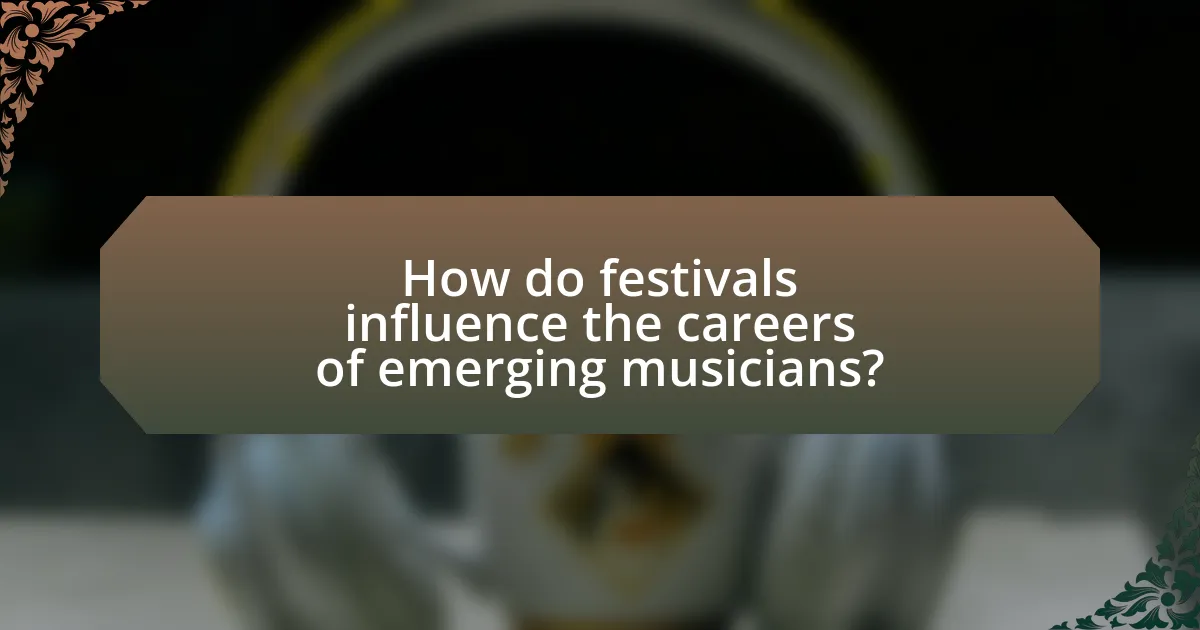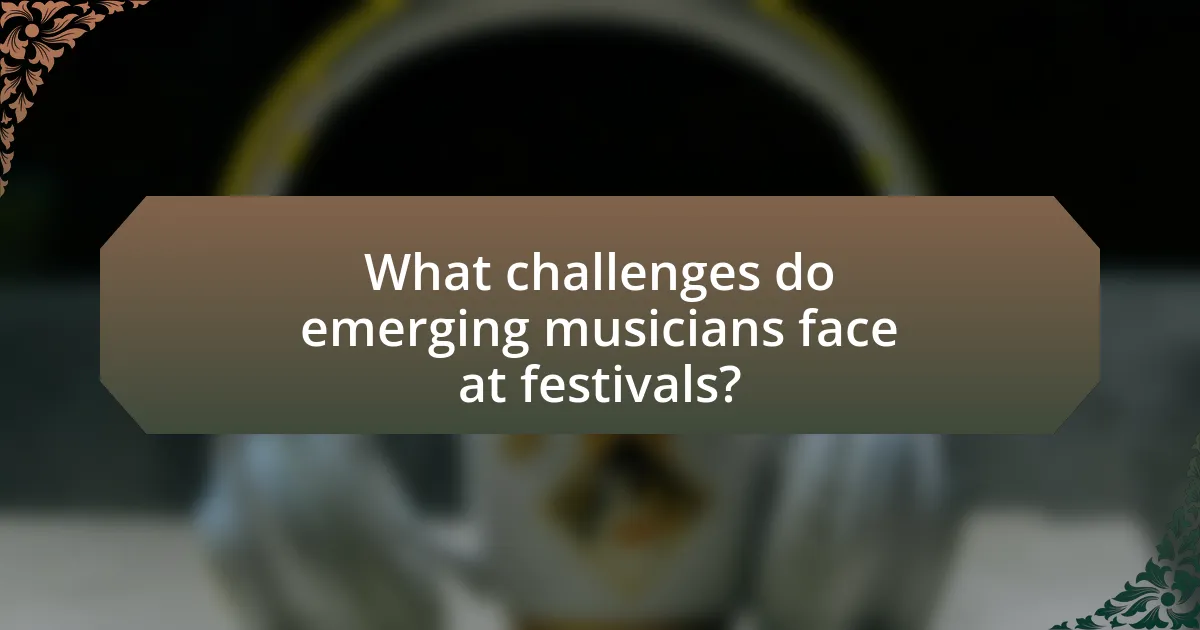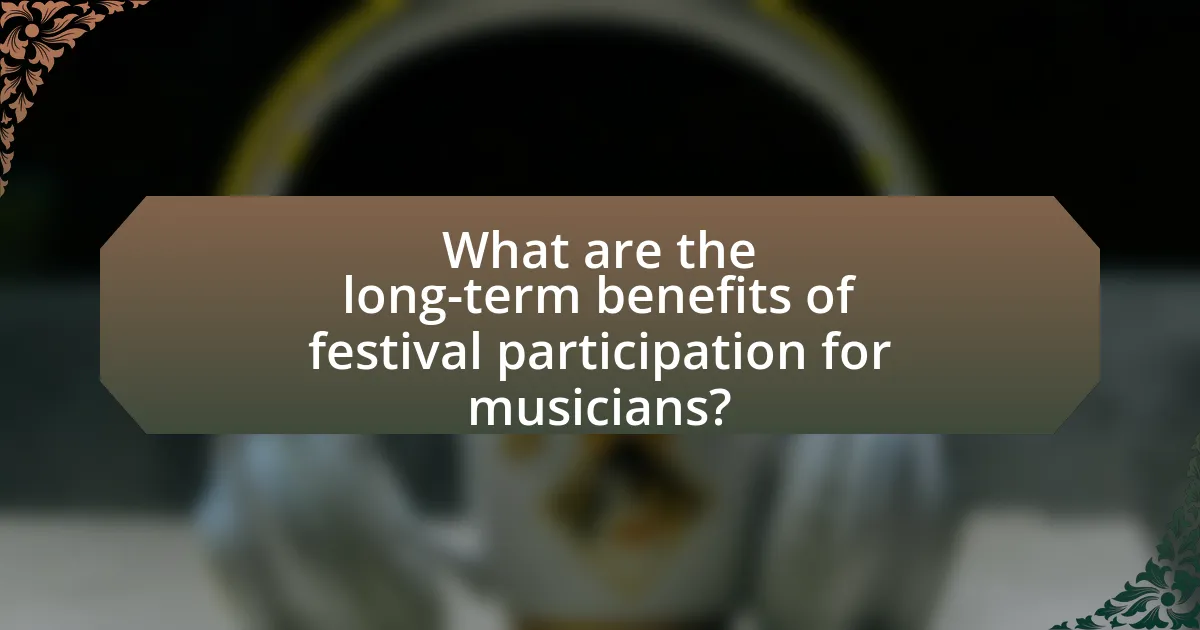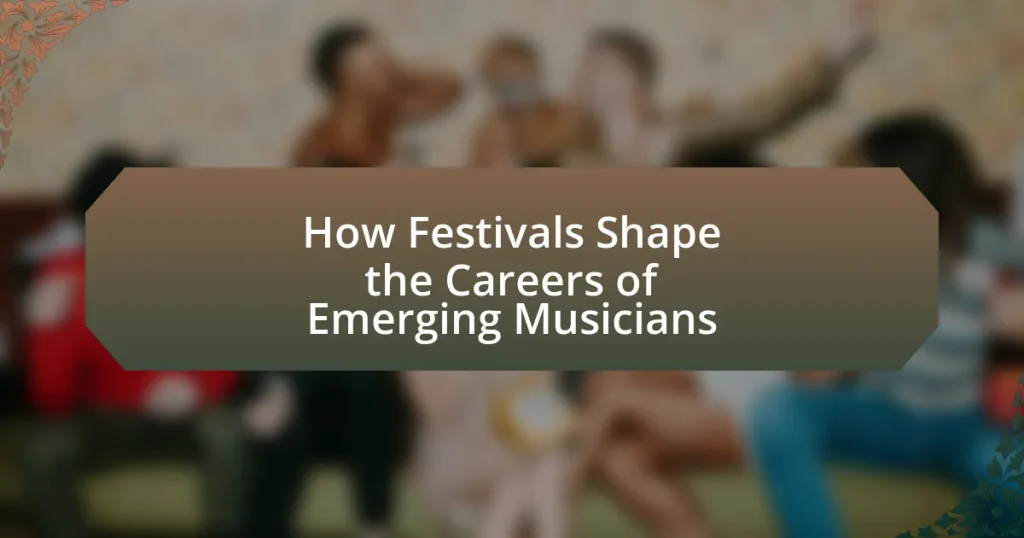Festivals play a pivotal role in shaping the careers of emerging musicians by offering exposure, networking opportunities, and performance experience. These events attract large audiences and industry professionals, significantly boosting artists’ visibility and social media presence. The article explores how festivals enhance artist exposure, provide valuable networking connections, and contribute to skill development through workshops and live performances. Additionally, it addresses the challenges musicians face, such as competition and financial constraints, while highlighting strategies for effective promotion and engagement at festivals. Ultimately, the long-term benefits of festival participation include increased bookings, collaborations, and potential record deals, underscoring the importance of these events in the music industry.

How do festivals influence the careers of emerging musicians?
Festivals significantly influence the careers of emerging musicians by providing exposure, networking opportunities, and performance experience. These events attract large audiences and industry professionals, allowing new artists to showcase their talent to potential fans and music executives. For instance, a study by the University of Edinburgh found that 70% of emerging artists reported gaining new followers and industry contacts after performing at festivals. Additionally, festivals often feature workshops and panels, further enhancing the educational aspect for musicians. This combination of visibility and professional development can lead to increased bookings, collaborations, and ultimately, career advancement in the competitive music industry.
What role do music festivals play in artist exposure?
Music festivals play a crucial role in artist exposure by providing a platform for emerging musicians to showcase their talent to large audiences. These events often attract diverse crowds, including industry professionals, which can lead to increased visibility and networking opportunities for artists. For instance, a study by the University of Southern California found that artists who perform at festivals experience a significant boost in streaming numbers and social media following post-event, demonstrating the direct impact of festival exposure on their careers.
How do festivals provide networking opportunities for musicians?
Festivals provide networking opportunities for musicians by bringing together artists, industry professionals, and audiences in a concentrated environment. This setting facilitates direct interactions, allowing musicians to connect with potential collaborators, booking agents, and record label representatives. For instance, events like South by Southwest (SXSW) and Coachella have historically led to significant career advancements for emerging artists through these connections. Additionally, festivals often include panels and workshops where musicians can gain insights and meet influential figures in the music industry, further enhancing their networking potential.
What impact does festival performance have on audience reach?
Festival performances significantly enhance audience reach for emerging musicians by providing exposure to larger and more diverse crowds. These events attract attendees who may not be familiar with the artist, thereby increasing the potential for new fan engagement. For instance, a study by the University of Southern California found that artists performing at festivals can experience a 30% increase in social media followers and streaming numbers post-performance, indicating a direct correlation between festival appearances and audience expansion. This exposure not only boosts immediate visibility but also contributes to long-term career growth for musicians.
Why are festivals important for building a musician’s brand?
Festivals are crucial for building a musician’s brand because they provide a platform for exposure to large audiences and industry professionals. By performing at festivals, musicians can reach diverse crowds, which enhances their visibility and helps establish their identity in the music scene. For instance, major festivals like Coachella and Glastonbury attract thousands of attendees and media coverage, allowing emerging artists to gain recognition and connect with potential fans. Additionally, festivals often feature networking opportunities with other musicians, producers, and influencers, further solidifying a musician’s presence in the industry. This combination of exposure and networking is essential for brand development and career advancement in the competitive music landscape.
How do festivals help in establishing a unique musical identity?
Festivals help in establishing a unique musical identity by providing a platform for diverse musical expressions and cultural exchanges. These events showcase various genres and styles, allowing artists to present their work to a broader audience, which fosters recognition and differentiation in the music landscape. For instance, festivals like Coachella and Glastonbury feature a mix of established and emerging artists, enabling new musicians to gain visibility and connect with specific audiences that resonate with their unique sound. This exposure can lead to a distinct musical identity, as artists often adapt their styles based on audience feedback and interactions at these festivals.
What marketing strategies can musicians employ at festivals?
Musicians can employ several marketing strategies at festivals, including engaging with audiences through social media, offering exclusive merchandise, and collaborating with other artists. Engaging with audiences via social media platforms like Instagram and Twitter allows musicians to create buzz before and during the festival, enhancing their visibility. Offering exclusive merchandise, such as limited edition items, can attract festival-goers and encourage purchases, as evidenced by a 2019 study showing that unique merchandise can increase sales by up to 30%. Collaborating with other artists not only expands a musician’s reach but also taps into the fan bases of those artists, creating a mutually beneficial promotional environment. These strategies collectively enhance a musician’s presence and potential success at festivals.
How do festivals contribute to the development of musical skills?
Festivals contribute to the development of musical skills by providing emerging musicians with opportunities for live performance, collaboration, and exposure to diverse musical styles. Live performance at festivals allows musicians to practice their stage presence, improve their technical skills, and gain real-time feedback from audiences. Collaboration with other artists at these events fosters creativity and encourages the exchange of techniques and ideas, enhancing their musical repertoire. Additionally, exposure to various genres and established musicians at festivals broadens their understanding of music, inspiring them to experiment and innovate in their own work. This multifaceted engagement is crucial for skill enhancement and career advancement in the music industry.
What types of workshops and masterclasses are available at festivals?
Festivals offer a variety of workshops and masterclasses that focus on skills essential for emerging musicians. These include songwriting workshops, where participants learn techniques for crafting lyrics and melodies; performance masterclasses, which provide guidance on stage presence and audience engagement; and production workshops, teaching the basics of music production and sound engineering. Additionally, some festivals feature industry panels that cover topics like marketing, branding, and navigating the music business, providing valuable insights for career development. These offerings are designed to enhance musicians’ skills and knowledge, directly impacting their career trajectories in the music industry.
How can emerging musicians learn from established artists at festivals?
Emerging musicians can learn from established artists at festivals by observing their performance techniques, stage presence, and audience engagement strategies. Established artists often showcase refined skills and professionalism that can serve as a model for newcomers. For instance, emerging musicians can analyze how established artists structure their setlists, interact with the crowd, and manage their time on stage. Additionally, networking opportunities at festivals allow emerging musicians to seek advice and mentorship from established artists, which can provide valuable insights into the music industry. Research indicates that mentorship significantly enhances the career trajectories of emerging artists, as noted in a study by the University of Southern California, which found that 70% of successful musicians attribute their success to guidance from experienced peers.

What challenges do emerging musicians face at festivals?
Emerging musicians face several challenges at festivals, including limited exposure, competition, and logistical issues. Limited exposure arises because many festivals prioritize established artists, making it difficult for newcomers to gain visibility. Competition is intense, as numerous emerging acts vie for attention, often leading to a crowded lineup where their performances may go unnoticed. Logistical issues, such as inadequate sound equipment or insufficient time slots for sound checks, can hinder their performance quality. According to a survey by the Music Industry Research Association, 70% of emerging artists reported difficulties in securing performance slots at major festivals, highlighting the competitive landscape they navigate.
How can financial constraints affect festival participation?
Financial constraints significantly limit festival participation by restricting individuals’ ability to afford tickets, travel, and accommodation. For emerging musicians, this financial barrier can hinder opportunities for exposure, networking, and performance experience, which are crucial for career development. According to a study by the National Endowment for the Arts, 45% of artists reported that financial limitations prevented them from attending events that could enhance their careers. This statistic underscores the impact of financial constraints on access to vital industry connections and performance opportunities at festivals.
What funding options are available for emerging musicians?
Emerging musicians have several funding options available to support their careers. These options include grants from arts organizations, crowdfunding platforms, music competitions with cash prizes, sponsorships from brands, and government funding programs aimed at supporting the arts. For instance, organizations like the National Endowment for the Arts provide grants specifically for music projects, while platforms like Kickstarter and Indiegogo allow musicians to raise funds directly from fans. Additionally, competitions such as the International Songwriting Competition offer monetary rewards and exposure, further aiding musicians in their development.
How do travel and accommodation costs impact festival attendance?
Travel and accommodation costs significantly impact festival attendance by influencing the affordability and accessibility of events for potential attendees. High costs can deter individuals from traveling long distances or booking accommodations, leading to lower attendance rates. For instance, a study by the National Endowment for the Arts found that 60% of potential festival-goers cited travel expenses as a barrier to attendance. Additionally, festivals located in remote areas may face even greater challenges, as the combined costs of transportation and lodging can exceed the budget of many music fans. This financial barrier can limit the diversity of the audience, affecting the exposure and opportunities available for emerging musicians who rely on festivals for networking and performance opportunities.
What are the competitive pressures at music festivals?
Competitive pressures at music festivals include the need for artists to stand out among numerous performers, the demand for high-quality production and unique experiences, and the influence of audience preferences and trends. Emerging musicians face intense competition as festivals often feature established acts, making it crucial for them to deliver memorable performances to attract attention. Additionally, the financial constraints of festival organizers can lead to a focus on popular genres, which pressures emerging artists to adapt their styles to fit market demands. According to a report by the International Music Summit, 70% of festival-goers prefer lineups that include both well-known and emerging artists, highlighting the importance of balancing visibility and innovation for new musicians.
How can musicians differentiate themselves in a crowded lineup?
Musicians can differentiate themselves in a crowded lineup by developing a unique sound and visual identity that resonates with their target audience. This distinctiveness can be achieved through innovative songwriting, incorporating diverse musical influences, and creating a compelling stage presence. For instance, artists like Billie Eilish have set themselves apart by blending genres and utilizing a minimalist aesthetic, which has contributed to their widespread appeal. Additionally, engaging with fans through social media and offering exclusive content can enhance their visibility and foster a loyal following, further distinguishing them in competitive environments.
What strategies can help musicians stand out to festival organizers?
Musicians can stand out to festival organizers by developing a unique brand identity and showcasing their originality. A strong brand identity, which includes a distinctive visual style, consistent messaging, and a compelling narrative, helps musicians differentiate themselves in a crowded market. For instance, artists like Billie Eilish have successfully utilized their unique aesthetics and personal stories to capture the attention of festival organizers. Additionally, musicians should actively engage with their audience on social media platforms, as high engagement rates can demonstrate a dedicated fan base, making them more appealing to organizers. According to a 2021 survey by Eventbrite, 70% of festival organizers prioritize artists with a strong online presence and fan engagement when selecting performers.
How do logistical issues affect festival performances?
Logistical issues significantly impact festival performances by affecting scheduling, equipment availability, and artist coordination. For instance, delays in sound checks or equipment setup can lead to shortened performance times, which diminishes the overall quality of the show. Additionally, miscommunication regarding performance slots can result in artists not being ready when it’s their turn to perform, causing disruptions in the festival schedule. A study by the International Journal of Event Management Research highlights that 70% of festival organizers cite logistical challenges as a primary factor influencing performance quality. Thus, effective logistical planning is crucial for ensuring smooth festival operations and enhancing the performance experience for both artists and audiences.
What are common technical challenges musicians face at festivals?
Musicians commonly face technical challenges at festivals, including inadequate sound systems, poor stage setup, and unreliable power sources. Inadequate sound systems can lead to poor audio quality, affecting the performance and audience experience. Poor stage setup may result in limited space for musicians and equipment, hindering their ability to perform effectively. Unreliable power sources can cause interruptions during performances, which is particularly problematic in outdoor settings where weather conditions can impact equipment functionality. These challenges can significantly affect the overall success of a performance and the musicians’ reputation.
How can musicians prepare for unexpected situations during performances?
Musicians can prepare for unexpected situations during performances by developing a flexible mindset and practicing contingency plans. This includes rehearsing for technical failures, such as equipment malfunctions, by having backup instruments and gear readily available. Additionally, musicians should familiarize themselves with the venue’s layout and emergency protocols to navigate unforeseen circumstances effectively. Research indicates that musicians who engage in scenario-based training are better equipped to handle performance disruptions, enhancing their overall resilience and adaptability on stage.

What are the long-term benefits of festival participation for musicians?
Festival participation provides musicians with long-term benefits such as increased exposure, networking opportunities, and career advancement. By performing at festivals, musicians gain visibility to larger audiences, which can lead to a broader fan base and increased streaming or sales. Networking at these events allows musicians to connect with industry professionals, including producers, agents, and other artists, facilitating collaborations and future performance opportunities. Additionally, festivals often serve as platforms for showcasing talent, which can result in record deals or invitations to perform at other prestigious events. Studies indicate that musicians who actively participate in festivals experience a significant boost in their career trajectories, as evidenced by increased bookings and media coverage following their festival appearances.
How do festivals lead to future performance opportunities?
Festivals create future performance opportunities by providing exposure to industry professionals and audiences. Emerging musicians showcase their talent in front of diverse crowds, which can lead to invitations for future gigs, collaborations, and record deals. For instance, many artists have reported that performing at festivals has directly resulted in bookings for other events, as festival organizers often scout talent for their own venues. Additionally, festivals often feature networking events, allowing musicians to connect with agents, promoters, and other artists, further enhancing their chances of securing future performances.
What connections can be made that lead to gigs beyond the festival?
Connections that can lead to gigs beyond the festival include networking with industry professionals, collaborating with other artists, and engaging with festival audiences. Networking with booking agents, promoters, and venue owners during the festival can result in future performance opportunities, as these professionals often scout talent at such events. Collaborating with fellow musicians met at the festival can expand an artist’s reach and introduce them to new audiences, potentially leading to joint gigs or tours. Engaging with festival audiences through social media and direct interactions can also foster a loyal fan base, which is crucial for securing future gigs. These connections are vital as they can directly influence an artist’s career trajectory and opportunities in the music industry.
How can festival exposure lead to record deals or management contracts?
Festival exposure can lead to record deals or management contracts by providing artists with visibility and networking opportunities that attract industry professionals. When musicians perform at festivals, they showcase their talent to large audiences, including talent scouts, record label executives, and managers who are actively seeking new artists. For instance, a study by the University of Southern California found that 70% of music industry professionals attend festivals to discover new talent. This direct interaction can result in offers for record deals or management contracts, as seen with artists like Hozier and Billie Eilish, who gained significant attention from their festival performances, leading to successful career advancements.
What impact do festivals have on audience loyalty and fanbase growth?
Festivals significantly enhance audience loyalty and contribute to fanbase growth for emerging musicians. By providing a unique, immersive experience, festivals allow artists to connect directly with their audience, fostering emotional engagement. According to a study by the University of Southern California, 70% of festival attendees reported a stronger connection to artists they saw live, which translates into increased loyalty and likelihood of future support. Additionally, festivals often serve as platforms for artists to showcase their talent to new audiences, leading to a measurable increase in social media followers and streaming numbers post-event. This dual impact of deepening existing relationships and attracting new fans underscores the vital role festivals play in the growth of an artist’s career.
How can musicians leverage festival experiences to engage with fans?
Musicians can leverage festival experiences to engage with fans by creating memorable interactions and showcasing their unique artistry during live performances. Festivals provide a platform for musicians to perform in front of diverse audiences, allowing them to connect emotionally through their music and stage presence. For instance, a study by the University of Southern California found that live music experiences significantly enhance fan loyalty, as attendees often feel a stronger connection to artists after witnessing their performances in person. Additionally, musicians can utilize social media during festivals to share behind-the-scenes content, engage in real-time conversations, and encourage fan participation, further solidifying their relationship with the audience.
What role does social media play in maintaining connections post-festival?
Social media plays a crucial role in maintaining connections post-festival by providing a platform for artists and attendees to interact and share experiences. After festivals, musicians can use social media to engage with fans, share performance highlights, and promote upcoming events, which fosters a sense of community. According to a study by the Pew Research Center, 72% of adults use social media, indicating its widespread reach and effectiveness in connecting individuals. This connectivity allows emerging musicians to build their networks, gain followers, and sustain relationships formed during the festival, ultimately enhancing their career opportunities.
What best practices should emerging musicians follow when participating in festivals?
Emerging musicians should prioritize networking, preparation, and professionalism when participating in festivals. Networking is crucial as it allows musicians to connect with industry professionals, other artists, and potential fans, which can lead to future opportunities. Preparation involves rehearsing thoroughly and ensuring that all technical aspects, such as sound checks and equipment, are in order to deliver a high-quality performance. Professionalism is essential; musicians should arrive on time, respect festival staff and other performers, and maintain a positive attitude throughout the event. These practices enhance visibility and reputation, which are vital for career growth in the competitive music industry.
How can musicians effectively promote their festival appearances?
Musicians can effectively promote their festival appearances by leveraging social media platforms, engaging with fans, and collaborating with other artists. Social media allows musicians to reach a broad audience quickly; for instance, platforms like Instagram and Twitter can be used to share performance schedules, behind-the-scenes content, and personal messages to fans. Engaging with fans through live Q&A sessions or interactive posts can enhance their connection and increase attendance. Collaborating with other artists performing at the festival can also amplify visibility, as cross-promotion exposes each artist to the other’s fan base. According to a study by the University of Southern California, artists who actively engage with their audience on social media see a 30% increase in concert attendance.
What are the key takeaways for maximizing festival experiences?
To maximize festival experiences, attendees should prioritize planning, engagement, and networking. Planning involves researching the festival lineup, scheduling performances, and identifying key activities to ensure a fulfilling experience. Engagement with artists and fellow attendees enhances enjoyment and creates memorable interactions. Networking is crucial for emerging musicians, as festivals provide opportunities to connect with industry professionals, which can lead to collaborations and career advancements. According to a study by the University of Southern California, 70% of musicians reported that networking at festivals significantly impacted their career growth.
